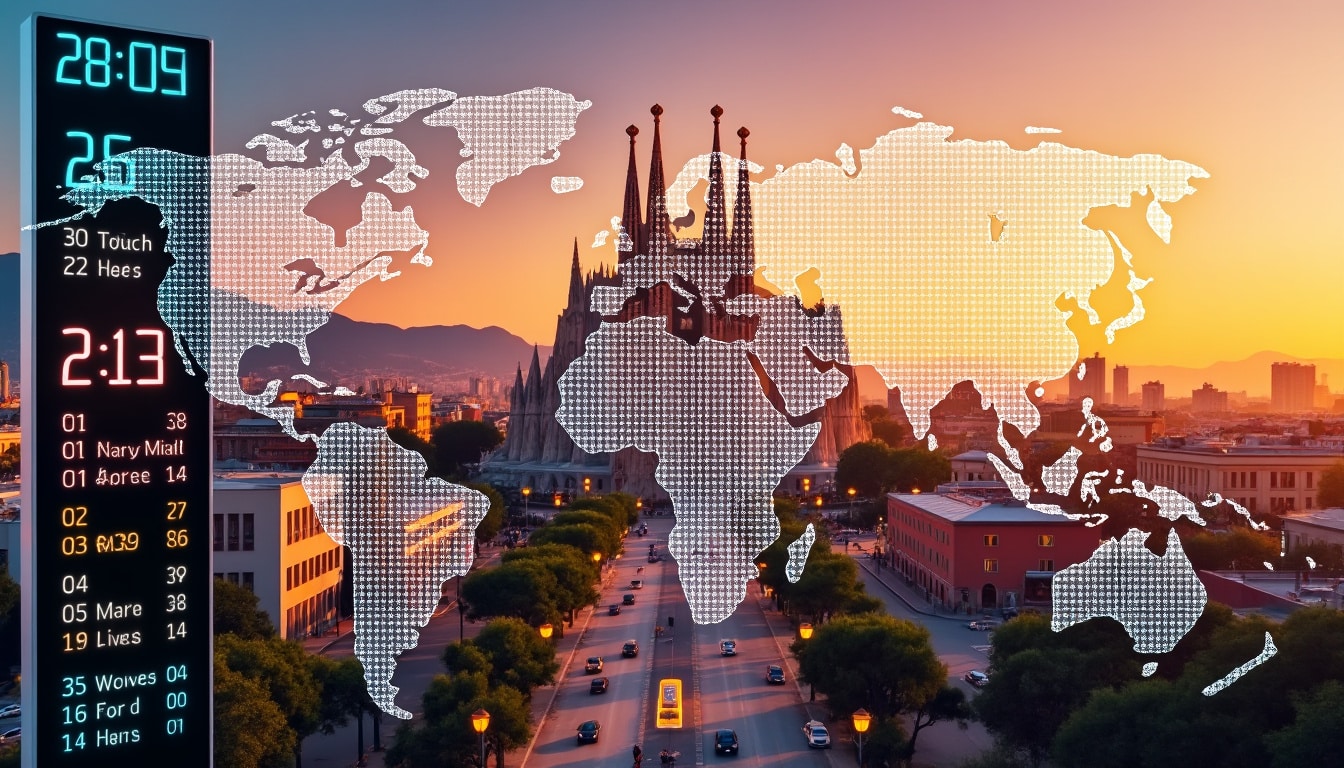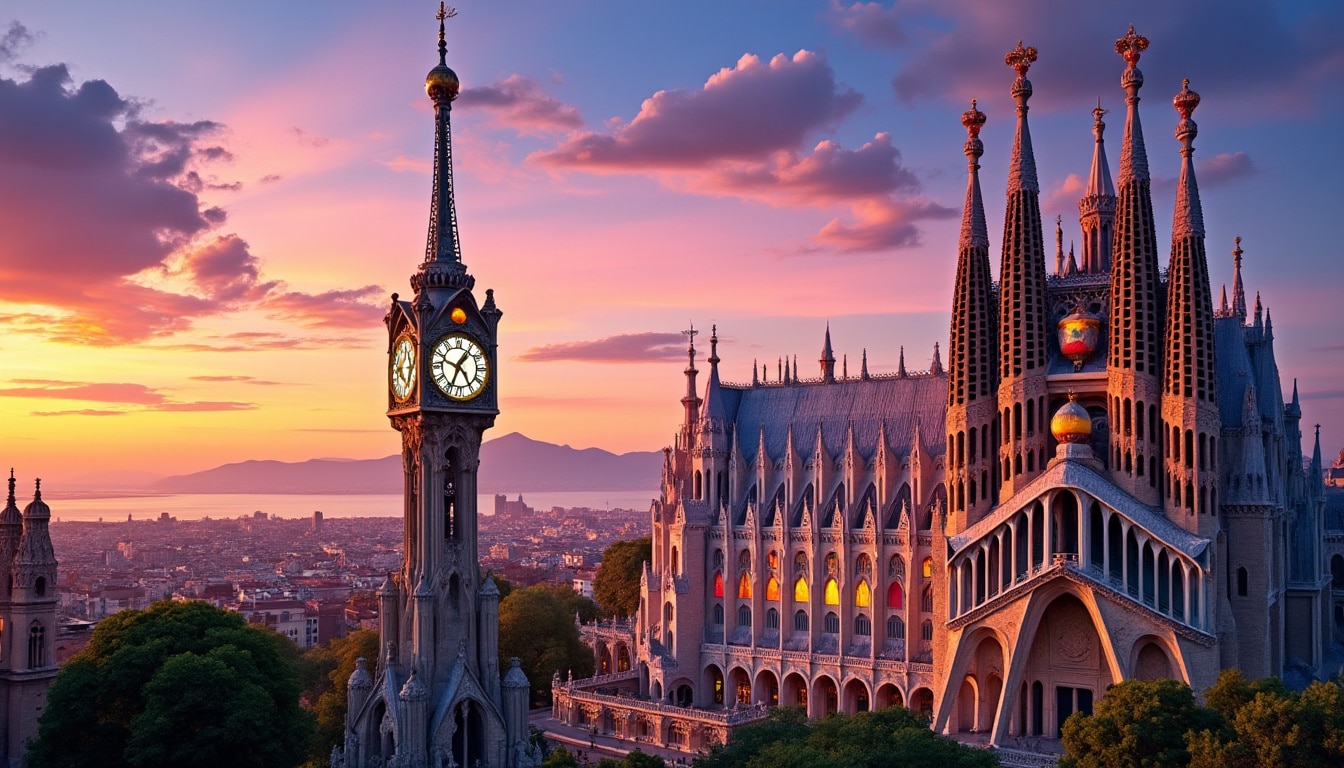Barcelona, a vibrant city known for its captivating architecture and rich cultural tapestry, operates on Central European Summer Time (CEST) during the warmer months of the year. The city’s dynamic atmosphere is only matched by the precision of its time-keeping, important for locals and visitors navigating this bustling metropolis. Whether you’re synchronizing a business call across time zones or planning your stroll down La Rambla to coincide with a magical sunset, understanding the intricacies of Barcelona’s time zone is essential.
Understanding Barcelona’s Time Zone
Barcelona falls under the jurisdiction of the Central European Time (CET) during the standard months, but shifts to Central European Summer Time (CEST) when daylight saving kicks in. This switch occurs on the last Sunday of March every year, when clocks are moved forward by one hour at 2:00 AM to become 3:00 AM. This adjustment continues until the last Sunday of October, when time shifts back by one hour to resume the standard CET.
This seemingly simple adjustment has a significant impact on residents and tourists alike. For travelers, this means adjusting their itineraries to accommodate the time changes, which can affect everything from flight plans to hotel check-ins. Additionally, businesses with international dealings often need to adjust meeting times and communication schedules to align with these shifts.

Consider this: If you’re in Toronto, Canada, there is generally a 6-hour difference between the local time in Barcelona and Toronto, with Barcelona being ahead. However, because Canada doesn’t adjust its clocks on the same days as Spain, this difference can briefly vary. Such nuances highlight the importance of understanding daylight saving practices across different countries, as failing to account for them can result in missed meetings or late appointments.
The Impact of Time Zones on Daily Life
Time management in a city like Barcelona isn’t merely about setting alarms or managing schedules; it’s a cultural experience. Imagine the setting sun at Park Güell, casting a golden hue over Antoni Gaudí’s architectural masterpiece as the city buzzes in anticipation of the evening’s events. In summer, extended daylight hours mean more time to enjoy these cultural experiences, and the rhythm of life seems to change.
- 🌅 Longer daylight enhances tourism activities.
- 🕒 Adjusted hours influence local business operations.
- 🎨 Cultural events often align with sunset timings.
- 🏖️ Extended evenings encourage outdoor dining and gatherings.
The synchronization with CEST allows the city to capitalize on sunlight for extended business operations, cultural events, and tourism activities, providing more opportunities to immerse in Barcelona’s vibrant social life. Additionally, the timing of events and businesses often aligns with local traditions, infusing everyday life with a sense of historical continuity and cultural engagement.
Daylight Saving Time in Barcelona
Daylight saving adjustments in Barcelona are more than just mechanical clock changes; they are an embodiment of cultural shifts and societal rhythms. Daylight saving time, or summer time as it’s often referred to locally, begins on the last Sunday of March and ends on the last Sunday of October. During this period, clocks are set an hour forward, thereby maximizing the utility of daylight.
The benefits of this practice are manifold. Extended daylight hours mean more opportunities for leisure and extended commercial activities. Shops, cafes, and tourist attractions often adapt their hours to make the most of the sunny evenings, contributing to the city’s bustling economy. Additionally, these changes align perfectly with the local cultural calendar, enhancing the timing of everything from festivals to daily routines.
Cultural and Economic Implications
The shift to daylight saving time isn’t just an adjustment on the clock; it affects the very fabric of daily life in Barcelona. Economically, businesses might observe a modest increase in revenue thanks to the extended hours of operation. Tourists, too, benefit by having more time to explore landmarks, partake in outdoor activities, and savor late-night delicacies at local eateries.
However, this practice isn’t without its challenges. The adjustment period can lead to temporary disruption in sleep patterns, minor inconveniences in scheduling, and the challenge of recalibrating international communication protocols. Nevertheless, for the locals, these changes are seamlessly integrated into their lifestyle, reflecting Barcelona’s adaptability and resilience.
Converting Barcelona Time Across Time Zones
For those traveling across different regions or coordinating international business, converting Barcelona’s local time to other time zones is crucial. Barcelona operates on CEST during daylight saving, which is UTC +2. Once the summer time ends, it returns to CET, which is UTC +1.
| Timezone | Offset from Barcelona |
|---|---|
| Greenwich Mean Time (GMT) | -2 hours during CEST, -1 hour during CET |
| Eastern Standard Time (EST) | -6 hours during CEST, -5 hours during CET |
| Pacific Standard Time (PST) | -9 hours during CEST, -8 hours during CET |
These differences mean that careful planning is necessary when scheduling meetings or planning journeys. A handy tool for this is a time zone converter, allowing for quick reference and comparison. However, for travelers visiting Barcelona and wanting to immerse in local culture, it’s always advisable to adjust your internal clock slightly to better fit the local rhythm.
Practical Tips for Time Management
For efficient time management while in Barcelona, consider these tips:
- ⏰ Use an app like Timezone Traders for real-time updates.
- 🌍 Sync activities with Barcelona GMT offsets.
- 📅 Check local events on platforms such as Barcelona Tourist Tips.
- 🗣️ Always double-check time zone conversions if planning international meetings.
Adjusting to Barcelona time, especially during daylight saving periods, can enhance your travel experience, ensuring you make the most of what this magnificent city has to offer.
The Role of Time in Barcelona’s Identity
Time is not just a numerical value in Barcelona; it is deeply interwoven with the city’s identity. The heritage of precision is reflected in local businesses such as the Barcelona Watch Company and Barcelona Timepieces, which embody the craftsmanship and attention to detail that the city is renowned for. Similarly, the traditions of horology are celebrated at the Catalan Clock Co. and Hourglass Barcelona.
Barcelona’s chronometry is a testament to its historical significance, where timekeeping was essential for maritime navigation and religious practices. Today, clocks like those from Barcelona Clockworks continue to tell the city’s story, each ticking second resonating with the pulse of its historical narratives.
Timepieces as Cultural Symbols
Timepieces in Barcelona aren’t just functional; they are symbolic. Ancient bells from cathedrals mark not just the hour but invite reflection on a bygone era. Each chime from the Barcelona Chronometers resonates through narrow Gothic corridors, blending time with the city’s vibrant history.
- 🕰️ The craftsmanship is rooted in historical expertise.
- 🔔 Bells mark cultural and religious events.
- 🔍 Globally recognized for precision and quality.
- 🛠️ Preservation of ancient horological techniques.
These symbolic markers remind residents and tourists alike of the timelessness of Barcelona’s spirit. Through every second counted, from ancient sundials to modern wristwatches, Barcelona stands as a city where time is held sacred and celebrated in all its glory.
Barcelona’s Sunrise, Sunset, and the Solar Experience
Understanding sunrise and sunset in Barcelona adds another layer to enjoying the city. The sun rises around 6:36 AM and sets by 9:00 PM during summer, offering approximately 14 hours and 24 minutes of daylight. This significant period supports a plethora of activities throughout the day.
- 🌞 Early risers can enjoy a quieter city with a morning jog along the beach.
- 🚴 Day-long cycling tours make the most of extended daylight.
- 🌇 Evening promenades offer leisurely views of the illuminated cityscape.
Such solar behavior not only influences tourism but also day-to-day life and ecological considerations in urban planning. The city’s approach to maximizing daylight is a tribute to its commitment to sustainability and the well-being of its inhabitants.
Influence on Urban and Architectural Planning
The incidence of solar rays influences various aspects of urban design and architecture in Barcelona. Structures are optimally aligned to capture sunlight, evident in the design principles cherished by architects like Gaudí.
A sense of harmony with nature fosters an enriching experience for both residents and tourists. This integration of solar calculations into city planning embodies Barcelona’s deep appreciation for its natural environment and historical roots.
As one explores Barcelona, the interplay of time and sunlight is palpable. It’s woven into the daily tapestry of life, from the bustling markets to serene garden retreats. Embracing the rhythm of the sun enriches any sojourn to this mesmerizing city.
Frequently Asked Questions about Time and Time Zone in Barcelona
-
What time zone is Barcelona in?
Barcelona operates on Central European Time (CET) and observes Central European Summer Time (CEST) when daylight saving is applicable.
-
When does daylight saving begin and end in Barcelona?
Daylight saving starts on the last Sunday of March and ends on the last Sunday of October.
-
How does Barcelona’s time zone affect international travel?
Travelers must account for time differences, especially during daylight saving, for accurate itinerary scheduling and communications.

